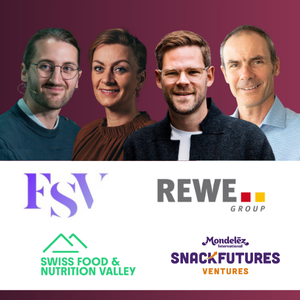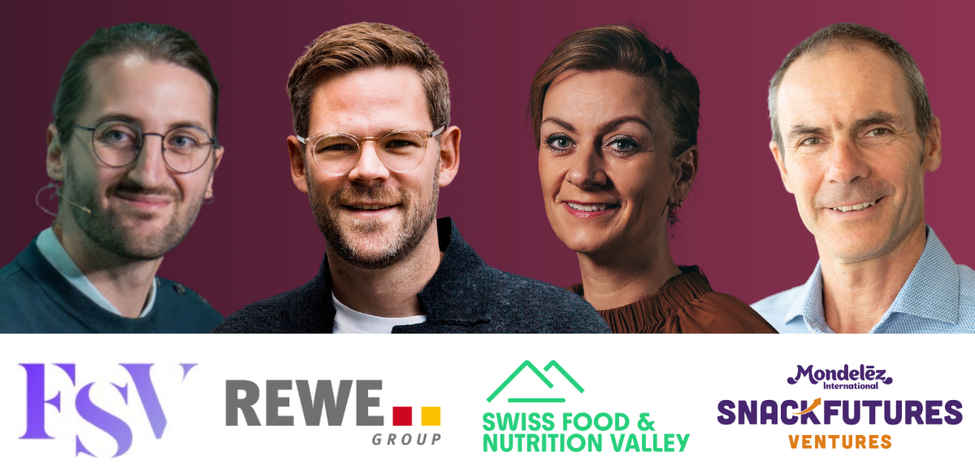Transforming the Food System for Climate and Human Health

Feeding an ever-growing population, while supporting climate and human health to flourish, is no small task. So, what does the sector need to prioritise in order to create products that nourish people and planet without a premium?
As consumers increasingly focus on the direct impact of food on health, food companies need to harness innovation for elevated taste and functionality, and adopt strategies for resilient supply chains that have limited environmental impact.
From the ultra-processed debate through to reformulating for improved nutritional density, summit speakers from MONDELĒZ INTERNATIONAL, FIVE SEASONS VENTURES, REWE GROUP and SWISS FOOD & NUTRITION VALLEY share their take on these important issues in the spotlight at Future Food-Tech in London on October 2-3.

As the need to improve access to affordable, nutritious food intensifies, how are companies working to create food that supports climate and human health without a premium?
Christina Senn-Jakobsen, CEO at SWISS FOOD & NUTRITION VALLEY details that companies are innovating to make nutritious, climate-friendly food affordable in many different ways: "Developing plant-based protein products, investing in regenerative agriculture, and breeding nutrient-dense and climate-change resilient crops. Many are also upcycling side-streams, utilising precision agriculture, improving supply chain efficiency with blockchain, and implementing corporate social responsibility initiatives. These strategies aim to lower costs and enhance the accessibility of healthy and sustainable food.”
Gaëtan Kerloc’h, Head of Impact at FIVE SEASONS VENTURES suggests direct-to-consumer could be the answer: "Fewer intermediaries mean more purchasing power going to the end consumer. This approach allows companies like Koro to be very transparent on their website about price increases, margins, etc. Another solution could be a model like the organic food retailer La Fourche, where people pay an annual membership in exchange for prices up to 50% lower."
Clément Tischer, Head of Food-Tech at REWE GROUP: “We recognise the increasing significance of our own brand products. We continuously reassess our assortment to ensure these products are affordable, nutritious, and environmentally friendly. We are also launching projects to help our own brand suppliers set reduction targets and develop more sustainable supply chains. By minimising resource-intensive processes and adopting sustainable practices, we can offer high-quality products without additional cost.”
Richie Gray, Vice President and Global Head of Snack Futures at MONDELĒZ INTERNATIONAL: “As a CVC, we have the unique opportunity to see, work with and invest in brands and businesses that are developing products and technologies in this space. For example, we’ve invested in Torr (technology to eliminate added sugars) and Celleste Bio (create a more sustainable cocoa supply). Access and affordability come with the ability to scale, so we are leaning into companies that have that high potential.”
In what ways can innovation be harnessed to improve nutritional density and health impacts, whilst ensuring production is sustainable?
Richie Gray, MONDELĒZ INTERNATIONAL breaks the answer down into four categories:
“There are a few ways to look at this: 1) Using sustainable agriculture and sourcing processes (and using partners that do this) for functional/nutritious ingredients. 2) Using formats and packaging that make it easy and convenient to consume nutritious products without excess waste. 3) Optimising/scaling practices such as upcycling ingredients to reduce food waste and improve nutrition.”
Christina Senn-Jakobsen, SWISS FOOD & NUTRITION VALLEY: “We’ve been going in the wrong direction. The average European apple today only contains 5% of the nutrients it used to 30 years ago.
Regenerative farming practices are vital. They restore soil health, combat soil degradation, enhance biodiversity and increase the nutritional density of crops. Precision agriculture technologies can optimise resource use (both chemicals and water) and reduce waste and environmental impact. Vertical farming and hydroponics provide efficient ways to grow food in urban areas, minimising land and water use and transport impact.
Plant-based and alternative proteins can also offer consumers nutritious options with a lower carbon footprint. Upcycling food waste into new products further reduces environmental impact and enhances food availability.
Collectively, these innovations ensure that food production is both nutritious and sustainable.”
Clément Tischer, REWE GROUP: “Fermentation technologies like biomass and precision fermentation not only enhance the nutritional value and health benefits of plant-based alternatives but also have versatile applications across various categories. These methods use fewer resources, reduce emissions, and require less land, ensuring sustainable production.”
What positive changes have been implemented so far within the food industry to reach sustainability goals, and what challenges remain?
Clément Tischer, REWE GROUP states that the food industry has embraced many positive changes, including: "renewable energy, reduced plastic use, and increased sourcing transparency. Additionally, food retailers have expanded the range of plant-based alternatives and set ambitious climate reduction targets in line with the Science Based Targets initiative. However, challenges such as scaling sustainable practices, navigating supply chain disruptions, and the limited influence on consumer behaviour remain obstacles to achieving full sustainability.”
Christina Senn-Jakobsen, SWISS FOOD & NUTRITION VALLEY: “We see innovation and commitments from large enterprises in areas such as regenerative farming. However, impact at scale is still missing. We’ve made very little progress towards achieving the SDGs or towards operating within planetary boundaries. Some challenges include high costs and a lack of accessibility, scalability issues, regulatory hurdles, consumer acceptance, infrastructure needs, and the environmental impact of new technologies.”
Richie Gray, MONDELĒZ INTERNATIONAL: “Three things I’ve seen that I’m very excited about: 1) Upcycled ingredients, 2) Sustainable packaging, 3) Use of climate resilient ingredients/crops, 4) Cellular agriculture technologies.
There are many challenges, but the one we are seeing become more of a reality is the consumers’ acceptance and willingness to be part of the solution.”
Gaëtan Kerloc’h, FIVE SEASONS VENTURES: “The main positive aspect is that large corporations have set objectives on issues like climate change and plastic pollution and report on these goals in a standardized way. However, these targets are ambitious, so the pressure from consumers, finance partners, and regulators remains essential to ensure corporations have an incentive to achieve them.”
With consumer concern for Ultra Processed Foods (UPFs), what innovations are companies utilising to improve nutritional value of products? Are there also benefits to processing foods that ought to be highlighted?
Gaëtan Kerloc’h, FIVE SEASONS VENTURES believes this to be a very broad term: “Overall, we should reduce the consumption of UPFs because most of them increase the risk of developing cancer, heart disease, and diabetes. However, a recent study from WHO shows that some sub-groups, like cereals and plant-based alternatives, are not associated with higher health risks. At Five Seasons, we tend to focus more on the contents of the food rather than its degree of processing.”
Richie Gray, MONDELĒZ INTERNATIONAL is in agreement: “There is a lot of misinformation and misunderstanding about what processed foods are, and are not. Not all UPFs are created equal. Many play critical roles in the safety, security and access to food, as well as vehicles for critical nutrients that are lacking in our diets. It’s also important to remind ourselves that balance is what’s key – that health and nutrition are top priority while still making room for small indulgences.”
Christina Senn-Jakobsen, SWISS FOOD & NUTRITION VALLEY furthers this point, citing UPFs as necessary to ensuring accessible nutrition: “The UPF debate has been very one sided and has led to potentially inhibiting legislation in some places. We must acknowledge that food processing plays a key role in feeding the world safely and nutritiously. Extended shelf life makes it possible to reach all corners of the world. It’s a key way to reduce food waste. In some cases, processing can even enhance nutrient availability.
That said, our main diet should not be packed with sugar and fats. We should focus on producing food that has extended shelf lives and is also packed with nutrition.
In nations like the US where more than 60% of an average diet consists of UPF, the whole food ecosystem needs to step up and drive change to provide nutritious, affordable, and climate-friendly food.”
Clément Tischer, REWE GROUP: “Although UPFs are often criticised, certain processing methods can enhance nutrient bioavailability and food safety. Companies are leveraging technological advancements to reformulate products, reduce additives, and improve nutritional value. For instance, some are using fermentation technologies to enhance taste and texture. We expect more companies to adopt these technologies in the future.”
How does the industry ensure that consumers have enough education about the connection between diet and health?
Clément Tischer, REWE GROUP tells us that the industry is already investing in educational campaigns, collaborating with health professionals, and using digital platforms to inform consumers about the link between diet and health: "Labels like Nutri-Score help consumers better understand the health impact of products, and supply chain transparency about ingredient sourcing is becoming crucial for consumer education.”
Richie Gray, MONDELĒZ INTERNATIONAL: “Communicating properly across all channels – from packaging to websites, building consumer trust and working with experts throughout the ecosystem to ensure consumers are getting the right information.”
Gaëtan Kerloc’h, FIVE SEASONS VENTURES: “Many of our portfolio companies use their website and social media to educate consumers on the benefits of a healthier diet. However, I strongly believe that a mandatory, unbiased labeling system like NutriScore could significantly boost this awareness.”
Christina Senn-Jakobsen, SWISS FOOD & NUTRITION VALLEY: “I prefer this question: How can the food ecosystem empower citizens to make the right food choices for human and planetary health?
"We cannot ask citizens to know everything about our incredibly complex food system. We need systemic change to make it easy for people to do the right thing. If everyone in the ecosystem takes responsibility to drive sustainable food systems –, producers, retailers, gastronomy, government (through shifts in subventions and innovation-enabling legal frameworks), schools, media, every company canteen – that is when we will see change.
"But to answer the question, industry does a lot through labelling, public health campaigns with government and health organisations, and school and community programs. What’s needed now is collaboration across the entire food value chain.”
To join powerful conversations with Clément, Richie, Gaëtan and Christina, in addition to 100+ visionary speakers and 500+ decision makers from across the value chain, you need to be at Future Food-Tech London on October 2-3.
The early bird sale is live, and discounted tickets are available until August 14. Register now to save £300 and secure your seat at the table.

)
)
)
)